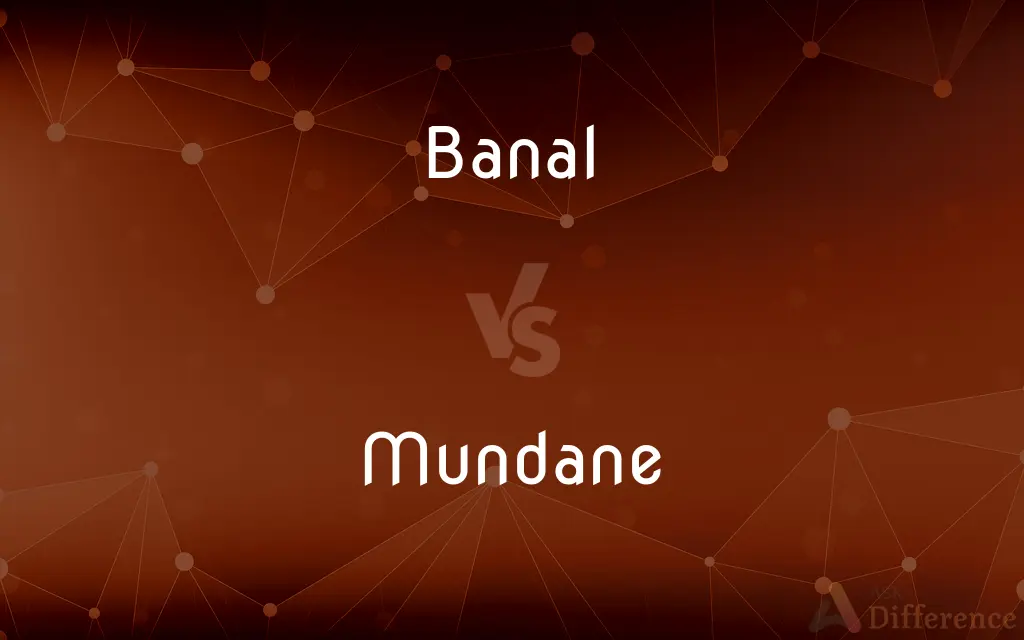Banal vs. Mundane — What's the Difference?
Edited by Tayyaba Rehman — By Urooj Arif — Updated on May 1, 2024
Banal refers to something overly familiar and lacking originality, whereas mundane implies ordinariness and routine, devoid of excitement.

Difference Between Banal and Mundane
Table of Contents
ADVERTISEMENT
Key Differences
Banal is often used to describe ideas, remarks, or elements that are so common and predictable that they become dull. In contrast, mundane refers to everyday, ordinary aspects of life that are typical and unremarkable.
A banal comment or suggestion might be one that has been repeated so frequently that it loses its significance, while mundane tasks like household chores are characterized by their routine nature and lack of novelty.
In literature, banal themes or plots can make a story unengaging due to their overuse, whereas mundane settings or characters might be intentionally used to evoke a sense of realism and relatability.
In the context of creativity, banal works are often criticized for lacking freshness and innovation, whereas mundane subjects can be uplifted through unique perspectives and artistic approaches.
While banal implies a negative critique of originality, mundane does not inherently carry a negative connotation; it merely describes the commonplace or typical elements of daily life.
ADVERTISEMENT
Comparison Chart
Definition
Lacking originality, predictable
Common, everyday, ordinary
Connotation
Often negative, implying dullness
Neutral, describing routine or typical aspects
Usage in speech
Used to criticize ideas, comments, or media
Describes life’s everyday tasks and settings
Impact on interest
Reduces interest due to overfamiliarity
Maintains a neutral level of interest
Example context
Banal remarks in a conversation
Mundane details of daily routines
Compare with Definitions
Banal
Something clichéd due to excessive use.
His banal speech consisted of the same old platitudes.
Mundane
Lacking excitement or interest, routine.
He found his mundane office job increasingly tiresome.
Banal
Overused and unoriginal content.
The movie's plot was banal and uninspiring.
Mundane
Not supernatural, earthly.
The novel focuses on the mundane lives of its characters.
Banal
Trite and unimaginative expressions.
Her poem was filled with banal phrases about love and loss.
Mundane
Pertaining to the ordinary aspects of daily life.
Mundane chores can be surprisingly therapeutic.
Banal
Lacking freshness and zest.
The author's latest book is banal and disappointing.
Mundane
Relating to the world rather than anything spiritual or abstract.
She preferred discussions about mundane, practical issues.
Banal
Dull because of predictability.
The dialogue in the play was banal and lacked depth.
Mundane
Commonplace or usual activities.
Grocery shopping is a mundane but necessary task.
Banal
So lacking in originality as to be obvious and boring
Songs with banal, repeated words
Mundane
In subcultural and fictional uses, a mundane is a person who does not belong to a particular group, according to the members of that group; the implication is that such persons, lacking imagination, are concerned solely with the mundane: the quotidian and ordinary. The term first came into use in science fiction fandom to refer, sometimes deprecatingly, to non-fans; this use of the term antedates 1955.
Banal
Drearily commonplace and often predictable; trite
“Blunt language cannot hide a banal conception” (James Wolcott).
Mundane
Lacking interest or excitement; dull
His mundane, humdrum existence
Banal
Common in a boring way, to the point of being predictable; containing nothing new or fresh.
Mundane
Of this earthly world rather than a heavenly or spiritual one
According to the Shinto doctrine, spirits of the dead can act upon the mundane world
Banal
Relating to a type of feudal jurisdiction or service.
Mundane
Of, relating to, or typical of this world; secular.
Banal
Commonplace; trivial; hackneyed; trite.
Mundane
Relating to, characteristic of, or concerned with commonplaces; ordinary.
Banal
Obvious and dull;
Trivial conversation
Commonplace prose
Mundane
Worldly, earthly, profane, vulgar as opposed to heavenly.
Banal
Repeated too often; overfamiliar through overuse;
Bromidic sermons
His remarks were trite and commonplace
Hackneyed phrases
A stock answer
Repeating threadbare jokes
Parroting some timeworn axiom
The trite metaphor `hard as nails'
Mundane
Pertaining to the Universe, cosmos or physical reality, as opposed to the spiritual world.
Mundane
Ordinary; not new.
Mundane
Tedious; repetitive and boring.
Mundane
An unremarkable, ordinary human being.
Mundane
A person considered to be "normal", part of the mainstream culture, outside the subculture, not part of the elite group.
Mundane
A person who is not a Satanist.
Mundane
The world outside fandom; the normal, mainstream world.
Mundane
Of or pertaining to the world; worldly, as contrasted with heavenly; earthly; terrestrial; as, the mundane sphere; mundane concerns.
The defilement of mundane passions.
Mundane
Commonplace; ordinary; banal.
Mundane
Found in the ordinary course of events;
A placid everyday scene
It was a routine day
There's nothing quite like a real...train conductor to add color to a quotidian commute
Mundane
Concerned with the world or worldly matters;
Mundane affairs
He developed an immense terrestrial practicality
Mundane
Belonging to this earth or world; not ideal or heavenly;
Not a fairy palace; yet a mundane wonder of unimagined kind
So terrene a being as himself
Common Curiosities
How do authors avoid banality in writing?
Authors can avoid banality by introducing novel ideas, creative language, and unexpected plot twists.
Can a conversation be both banal and mundane?
Yes, a conversation can be both banal if it is filled with clichéd expressions, and mundane if it covers everyday topics.
Is banal always a negative term?
Banal typically carries a negative connotation as it criticizes a lack of originality.
What types of tasks are considered mundane?
Tasks like cleaning, commuting, and filing paperwork are often considered mundane.
Can a lifestyle be banal?
A lifestyle can be considered banal if it lacks variation and innovation.
How can mundane elements be made interesting in art?
Artists can make mundane elements interesting by presenting them in unique contexts or through unusual perspectives.
Can mundane be used in a positive sense?
Yes, mundane can be seen in a neutral or even positive light when appreciating the simplicity and reality of everyday life.
Is mundane related to mundanity?
Yes, mundanity is the quality of being mundane, referring to the state of being ordinary or routine.
What is an example of a banal statement?
A banal statement might be saying, "At the end of the day, it is what it is."
What is the main difference between banal and mundane?
Banal implies something is overfamiliar and dull due to overuse, while mundane refers to the routine and commonplace aspects of life.
Share Your Discovery

Previous Comparison
Giant vs. Midget
Next Comparison
Fort vs. StrongholdAuthor Spotlight
Written by
Urooj ArifUrooj is a skilled content writer at Ask Difference, known for her exceptional ability to simplify complex topics into engaging and informative content. With a passion for research and a flair for clear, concise writing, she consistently delivers articles that resonate with our diverse audience.
Edited by
Tayyaba RehmanTayyaba Rehman is a distinguished writer, currently serving as a primary contributor to askdifference.com. As a researcher in semantics and etymology, Tayyaba's passion for the complexity of languages and their distinctions has found a perfect home on the platform. Tayyaba delves into the intricacies of language, distinguishing between commonly confused words and phrases, thereby providing clarity for readers worldwide.
















































